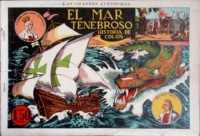Las Grandes Aventuras: Merlin el Mago Moderno: Difference between revisions
| Line 147: | Line 147: | ||
Image:LGA_Merlin_el_Mago_Moderno-1945.jpg|<center>[[Almanaque Merlín, el rey de la magia 1945|''Merlín'']]<br>1944 | Image:LGA_Merlin_el_Mago_Moderno-1945.jpg|<center>[[Almanaque Merlín, el rey de la magia 1945|''Merlín'']]<br>1944 | ||
Image:HA-Almanaque-1944-Yumbo.jpg|<center>''Yumbo''<br>1944 | |||
Image:Almanaque-1945-JyF.jpg|<center>''Jorge y Fernando''<br>1944 | Image:Almanaque-1945-JyF.jpg|<center>''Jorge y Fernando''<br>1944 | ||
Image:HA-Almanaque-1945-JC.jpg|<center>''Juan Centella''<br>1944 | Image:HA-Almanaque-1945-JC.jpg|<center>''Juan Centella''<br>1944 | ||
| Line 156: | Line 157: | ||
Image:HA-Almanaque-1947-JyF.jpg|<center>''Jorge y Fernando''<br>1946 | Image:HA-Almanaque-1947-JyF.jpg|<center>''Jorge y Fernando''<br>1946 | ||
Image:HA-Almanaque-1947-JC.jpg|<center>''Juan Centella''<br>1946 | Image:HA-Almanaque-1947-JC.jpg|<center>''Juan Centella''<br>1946 | ||
Image:HA-Almanaque-1948-HE.jpg|<center>''El Hombre Enmascarado''<br>1947 | |||
Image:HA-Almanaque-1949-HE.jpg|<center>''El Hombre Enmascarado''<br>1948 | |||
Image:HA-Almanaque-1949-Marvel.jpg|<center>''Marvel''<br>1948 | |||
</gallery> | </gallery> | ||
Revision as of 16:31, 24 December 2023
| Las Grandes Aventuras | |
 First issue | |
| Country/language: | |
|---|---|
| Publishing company: | Hispano Americana |
| Publishing years: | 1935-1953 |
| Issues: | 325 + |
| Format: | 21x32 cm, b/w |
In 1941 "Hispano Americana" started a new series under the generic title "Las Grandes Aventuras (The Great Adventures)". More then 325 issues were released without any numbering or publishing date on the covers or inside.
Issue overview
Regular series
The "Las Grandes Aventuras" series is usually categorized as several sub-series as: "Agente Secreto X-9 (Secret Agent X-9)", "El Hombre Enmascarado (The Phantom)", "Flas Gordon (Flash Gordon)", "Merlin el Mago Moderno (Mandrake the Magician)", "Tarzan" and on.
The series has price tag 1.5 ptas which increases to 2 ptas in 1948. In the beginning there are also issues with price tag 2.5 ptas, known as "número extraordinario", which follows the regular publication rate. Interesting, due to reprinting of issues in 1946, there exists some covers with two different price tags: "Flas Gordon" issues 1 to 4 (2.5 ptas / 2 ptas) and "El Hombre Enmascarado" issues 46-48 (1.5 ptas / 2 ptas).
Information for the next issue and a back issue list was printed on the back cover for many years.
In 1942 the back covers also printed various small stickers which could be collected into different sticker albums (Albumes Centella). The stickers were categorized into 24 different categories such as: Spanish football team, American movie stars, marvells of the word and on. Next the back covers have a comic strip of "Las Lecciones del Jefe Piloto", about how to fly a plane. The last sticker series on the back covers was devoted to Spanish football players. To collect all the sticker one also had to buy the various issues of the similar "Los Albumes Preferidos por la Juventud" series. There exists issues with different variants of the back cover due to later reprints.
Merlin el Mago Moderno
Note: Almost all issues are censored version. Someone has added extra ink to the femals for covering their shoulders, back and knees so the girls appears more decent dressed. Joaquín Esteve edited in collaboration with "Club Amigos de la Historieta" a facsimile reprint of the collection in 1983.
Extra series
Under the generic title Las Grandes Aventuras there were 12 Extra issues, one with Mandrake which went on sale between numbers 4 and 5 of the regular series.
Albums
The first time albums in this series are mentioned is on the back cover of the second issue with "Juan y Lois", "Juramento Cumplido". This issue has a text advertisement for the 1943 annual albums with "Jorge y Fernando" and "Juan Centella", so it must have been released in late November or early December 1942. The albums mentioned are the first two with "El Hombre Enmascarado (The Phantom)". The cover of these had a red border and this characteristic has given the name to the series: Album Rojo (the red albums).
The second time albums are mentioned in this series is in the seventh issue with "Juan y Lois", "El Lago de los Caimanes". It must have been released in late November or early December 1943, since it has an text ad for the 1944 annual albums with "Jorge y Fernando", "Juan Centella", "Yumbo" and "Merlín. The albums mentioned are: "El Hombre Enmascarado" (1-3), "Tarzán" (1-2), "Flas Gordon" (1-2) and "Merlín" (1). On the back cover of the annual album with "Jorge y Fernando" these albums are pictured. Like the first two albums with "El Hombre Enmascarado", the third album also has the characteristic red frame.
The other albums do not have a cover printed in color but are printed in black on a green cardboard, which has given these the name Album Verde (the green albums).
On the back cover of the annual album 1945 with "Jorge y Fernando" more of these albums are pictured: ("Juan Centella" (1-4), "Jorge y Fernando" (1, 3-4),) "El Hombre Enmascarado" (2, 4), "Tarzán" (1-3), "Flas Gordon" (1-2), "Merlín" (1-2) and "Agente Secreto X-9" (1). All having the characteristic red frame. Most of these issues are reprint from the previous year but where the green covers are replaced with color illustrationes.
- LGA Merlin Rojo-01.jpg
From the back covers of the "Las Grandes Aventuras" series, it appears that the fifth "El Hombre Enmascarado" issues was released just before the summer, and the third "Merlín" issue around December 1945. All the "Album Rojo" issues are regularly mentioned on the back covers in 1945 so they existed as back issues and were possibly reprinted regularly.
The issues Tarzan #4, "El Hombre Enmascarado" #8 and "Merlín" #4 seems to have been released in late spring 1946 and the two last issues with "El Hombre Enmascarado" around December 1946. At the end of the year, the price was also increased from the previous 7 pesetas to 10 pesetas.
Almanaque series
- Facsimiles editions of these issues have also been published in 1995.
See also
- MandrakeWiki: article for the back covers
- marianobayona.com: Tarzan
- marianobayona.com: El Hombre Enmascarado
- marianobayona.com: Ciclon
- lamemoriafrivola.blogspot.com: Hispano Americana (Conejín, Don Quijote de la Mancha)
Sources



























































































